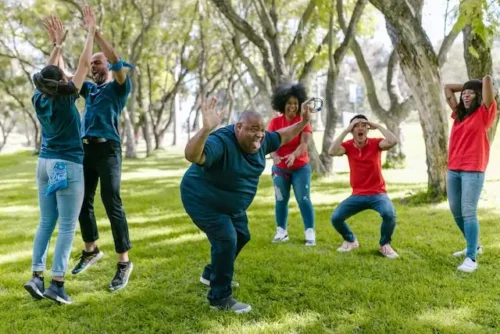
7 Fun Activities to Improve Your Mental Health
There are always going to be ups and downs in life since, without the dark, there would be no light. Giving in to our negative thoughts might indeed provide temporary relief, but in the end, it’s up to us to flip that script and remember the blessings in our lives. There are ways to make things easier when the storm clouds above you appear insurmountable. Therefore, if you are looking for ways to improve your quality of life, here are seven fun activities to improve your mental health.
The Importance of Taking Care of Your Mental Health
Maintaining good mental health is essential at any age. An emotionally robust person is better able to deal with life’s inevitable ups and downs and is less likely to have mental health issues like depression and anxiety. As a result, it is very important to be aware of the state of your mental health. Letting negative emotions rule your life can be harmful because it can influence:
- How you feel
- How you think
- How you act
It is possible to infer your stress response and ability to make life choices from the state of your mind. This is why mental health awareness is so crucial. When you have mental health issues, it can affect your physical health. It can cause chronic fatigue, high blood pressure, and headaches, as well as increase the risk of diabetes and heart disease. A healthy mind is equally as vital as a healthy body. Therefore, you need to take care of it, and here is how.
1. Exercising
Motivating yourself mentally to begin an exercise routine can be challenging, but the end result will be well worth it. That’s because research shows that physical activity improves mental health. There is mounting evidence that regular physical exercise has positive effects on mental health. In fact, one of the best ways to reduce stress and depression is by exercising. In addition to that, exercise can:
- Improve your sleep
- Boost your mood
- Enhance your energy and stamina
- Increase your mental alertness
- Improve your confidence
- Reduce cholesterol and improve cardiovascular health
Participating in sports, whether a casual match with friends or signing up for a local team, is another way to improve your mental health. Don’t forget to outfit yourself with supportive and comfortable shoes to support your active lifestyle.
It makes little difference which type of exercise you perform. As long as you’re working up a sweat, you’re doing it right. Therefore, activities ranging from running and walking to dancing, riding, and swimming can have a positive impact on your mental health. So, if you’ve been feeling anxious lately, it may be time to get back into your usual workout regimen to get your blood circulating and sweat the tension away.
2. Reading
The term “bibliotherapy” describes the practice of using books in a therapeutic context, whether via a prescribed reading program or on a more individual basis. Although it may seem counterintuitive, research has shown that reading can help reduce depressive symptoms. In fact, the experts at Harmony Ridge Recovery Center extensively use bibliotherapy to treat depression in people in recovery. They have found that reading a good book may reduce stress by as much as 68%. Curiously, some studies have shown that reading fiction may have a more positive effect on the reader than non-fiction. This is most likely because following a fictional character’s development over the course of a story may improve a reader’s empathy, social skills, and understanding of others. Picking up a book and losing yourself in its pages could be the perfect remedy if you’re overwhelmed.
3. Documenting Your Emotions
Putting your ideas, thoughts, anxieties, and problems on paper may be a really cathartic experience. Writing down your thoughts can assist with things like practicing gratitude, but you may also use it to work through your worries in the absence of a therapist. If you need help getting started, a quick internet search or conversation with a mental health professional should yield some valuable results. Additionally, keeping a journal can be a helpful tool for monitoring emotional changes over time. You’d be surprised how much can change without you even noticing. On the other hand, keeping a journal allows you to look back and assess how far you’ve come.
Read More: How Foods Can Improve Your Mental Health
4. Attending Social Events
It’s always a good idea to socialize a bit in addition to doing things or fun activities to improve your mental health on your own. After all, humans are hardwired for social interaction. When under stress, it’s natural to want to be alone. Nevertheless, a little bit of company can go a long way toward helping us relieve some of our stress. Several studies have demonstrated that regardless of age, gender, or physical health condition, individuals who have meaningful connections with family, friends, and the community are happier, have fewer health issues, and even live longer.
On the other hand, inadequate social support increases the likelihood of negative health outcomes like stress and inflammation. In fact, people with strong social ties are less likely to suffer from anxiety and depression. They also report higher levels of self-esteem, more empathy, and a greater willingness to collaborate with others. Whether you prefer real-life gatherings with friends and family or choose to put your time and energy into supportive online groups, it’s essential to keep good interactions with people around you.
5. Gardening
Many individuals like gardening not just as a way to improve their physical surroundings but also as a way to relax and unwind. Without a doubt, outdoor activities like gardening and landscaping can improve your mental health. This includes getting some fresh air, vitamin D, and moderate cardiovascular activity. In fact, research has shown that gardening effectively lowers cortisol, the body’s primary stress hormone. According to the results of one hospital research, 79% of patients reported feeling more relaxed and tranquil after visiting the hospital garden.
The advantages, however, do not end there. Gardening has several cognitive benefits, including reducing stress and improving focus. Spending time in nature has been shown to significantly reduce symptoms of ADHD. This disorder has a negative impact on the mental health of millions of people in the United States, according to research published in the American Journal of Public Health. If you’re finding it difficult to focus on even the simplest of activities or to keep up with the pace of the world around you, maybe you might benefit from spending some time in nature, letting Mother Nature restore your sanity.
6. Contributing to Your Community
There is no greater joy than assisting people in need. This is especially true if you are doing it for the benefit of your community. As a matter of fact, as you spread happiness, you will discover that your own life will be enriched. That being said, contributing to your community does not require you to immediately go out and feed the poor. You can start with something as simple as helping your neighbors with their groceries or helping someone move. But ultimately, it boils down to spending time to assist someone else out of the goodness of your heart. By giving back to the community and making new friends, volunteering can help you feel less lonely and isolated, which can help improve your mental health.
You may find it convenient to volunteer informally by babysitting, repairing, or caring for the children or older people of friends, relatives, or neighbors. One option is to join a formal volunteer program at a local institution like a school, hospital, or animal shelter. Giving money to a good cause is a great way to help if you can’t be there in person.
Read More: Moving and Mental Health: Tips for Coping with Depression
7. Getting Quality Sleep
Sleeping may not seem like a “fun activity,” but the positive effects it has on one’s mental health cannot be overstated. Even if you did everything we listed above, it wouldn’t help if you neglected sleep. That being said, studies have shown that sleeping less than six hours per night daily increases the risk of frequent mental discomfort by about 250% compared to those who sleep longer. However, the quantity of sleep isn’t the only factor; the quality of sleep you get is also important. Numerous adverse mental health outcomes have been associated with difficulties falling asleep or staying asleep. Thus, if you want to get the best sleep possible, you should:
- Limit caffeine intake after 3 p.m.
- Establish a routine where you get up and go to bed at roughly the same time each day
- Create a calm, relaxing, and uncluttered space in your bedroom
- Try to maintain a comfortable temperature in your bedroom, ideally around 65 degrees Fahrenheit (18.3 degrees Celsius)
If you suffer from a sleep disorder, it can be more challenging to establish and maintain a healthy sleep routine. However, a sleep specialist can provide more information about helpful evidence-based treatments, such as cognitive behavioral therapy for insomnia or something similar.
Conclusion
Hopefully, you can implement at least one of the seven fun activities to improve your mental health. Regular exercise, learning new skills, and getting enough rest can help boost your mood and give you more energy to cope with stress and other challenges in your life. However, it can also help you meet new people and increase confidence. Therefore, if you haven’t tried any of these activities yet, we encourage you to do so now.


